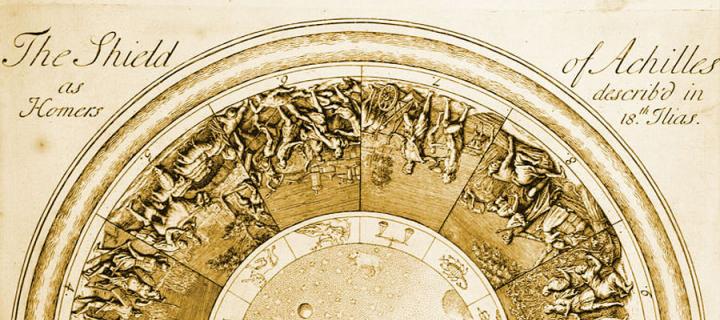Materiality, representation, and performance in archaic and classical Greek poetry
Literature is littered with objects: things created in words, materials embedded in text. But what is the relationship between language and object? How does the one contain or mediate the other? If language is the medium through which an object is constructed, to what extent is the thing co-extensive with the language that defines it?

How does the ontology of objects change when they are not of the real world, but constructs? Most of the theoretical standpoints of the New Materialisms are based on the real-world interactions between people and things: the relationship as seen through philosophy or anthropology. Comparatively little work has been done on literary representations of that relation. Mediation through language and through literature is a crucial factor which makes a substantial difference to the status of objects and to the location of agency. For instance, when Bryant 2011:88 writes ‘objects require no subjects to manifest themselves in the world’, this may be true of real-world objects but it is not the case for representations of them.
What effect does the medium or mechanism of representation have on the object represented, and what effect does the represented object have on the mediated domain? Both Greek epic and drama can be experienced through a text – but is there an agency of objects that goes beyond their textual constructedness? What role is played by performance and the presence of props? How do we negotiate the question of interface in our readings of ancient texts?
The conference aims to propagate ‘attentiveness to things’ (as vital materialist Jane Bennett puts it) – but also attentiveness to their literary representation.
Schedule at a Glance
Tuesday 20 June
09.00-9.30 Registration and welcome
- 9.30-10.15 Jakob Lenz, University of Heidelberg - Layers of Reality vs. Layers of Agency: A comparative analysis of how Homer’s Shield & Hesiod’s Pandora embody alternative worlds
- 10.15-11.00 Lilah Grace Canevaro, University of Edinburgh - Wrestling like Rafters: Objects and the Homeric Simile
11-11.30 Tea/Coffee
- 11.30-12.15 Jonas Grethlein, University of Heidelberg - Odysseus and his bed. From significant objects to thing theory in Homer
- 12.15-13.00 Amy Lather, Wake Forest University - Hephaestus' Artificial Intelligence: Robots and Automata in Homer and Hesiod
13.00-13.45 Lunch
- 13.45-14.30 Emma Griffiths, Manchester University - Hephaestus and Artificial Intelligence in Greek Myth
- 14.30-15.15 Nick Brown, Warwick University - Mantiklos’ Apollo: Real-World Object, Poetically Defined
15.15-15.45 Tea/Coffee
- 15.45-16.30 Elena Iaffe, Tel Aviv University - The Materiality of Language in Bacchylides
16.30-17.15 End of day discussion, and break
Keynote Lecture
- 17.15 Leslie Kurke, University of California Berkeley - The Rough Stones of Aegina: Pindar, Pausanias, and the Topography of Aeginetan Justice (The Charles Gordon Mackay Lecture)
Drinks reception
20.00 Conference dinner at a local restaurant
Wednesday 21st June
- 9.30-10.15 Melissa Mueller, University of Massachusetts Amherst - Iphigenia among the Ruins: Object life in Aeschylus and Euripides
- 10.15-11 Nancy Worman, Barnard College, Columbia University - Skin, Cloth, and Stone in Aeschylus and Euripides
11-11.30 Tea/Coffee
- 11.30-12.15 Joshua Billings, Princeton University - Orestes’ Urn in Word and Action
- 12.15-13.00 Mario Telò, University of California Berkeley - Aeschylean Archives
13.00-13.45 Lunch
- 13.45-14.30 Clara Bosak-Schroeder, University of Illinois, Urbana-Champaign - The Utopia-Slavery Phenomenon: Reading Comic Fragments with Barad
- 14.30-15.15 Daniel Anderson, University of Cambridge - The Scroll as Prop in Old Comedy
15.15-15.45 Tea/Coffee
- 15.45-16.30 Karen Bassi, University of California Santa Cruz - What gets left behind: Objects and death in Euripides' Alcestis
- 16.30-17.15 Bronwen Wickkiser, Wabash College, and Peter Schultz, North Dakota State University - Materiality and Performance in Fourth-Century Cultic Paeans: The Case of Epidauros
- 17.15-18.00 Concluding discussion
Close

Materiality, representation, and performance in archaic and classical Greek poetry
Sydney Smith Lecture Theatre (Doorway 1), Old Medical School, Teviot Place, Edinburgh EH8 9AG

